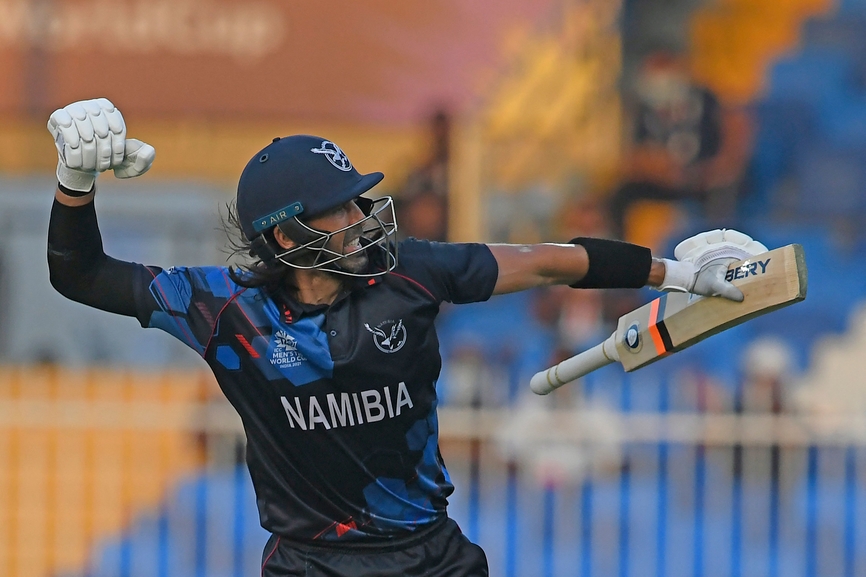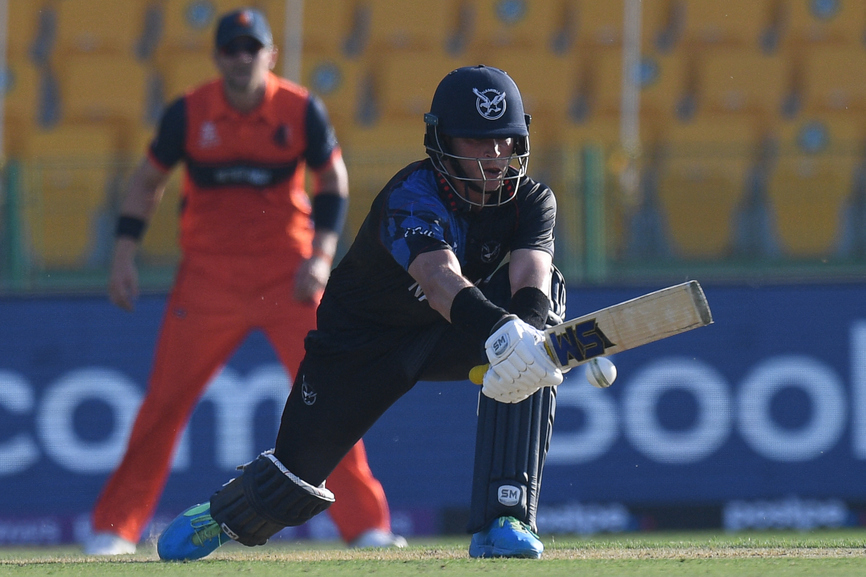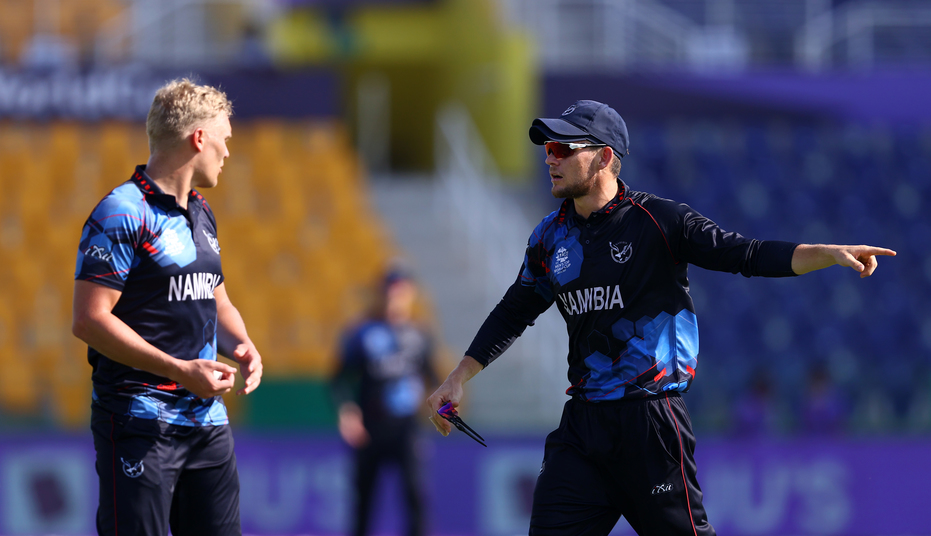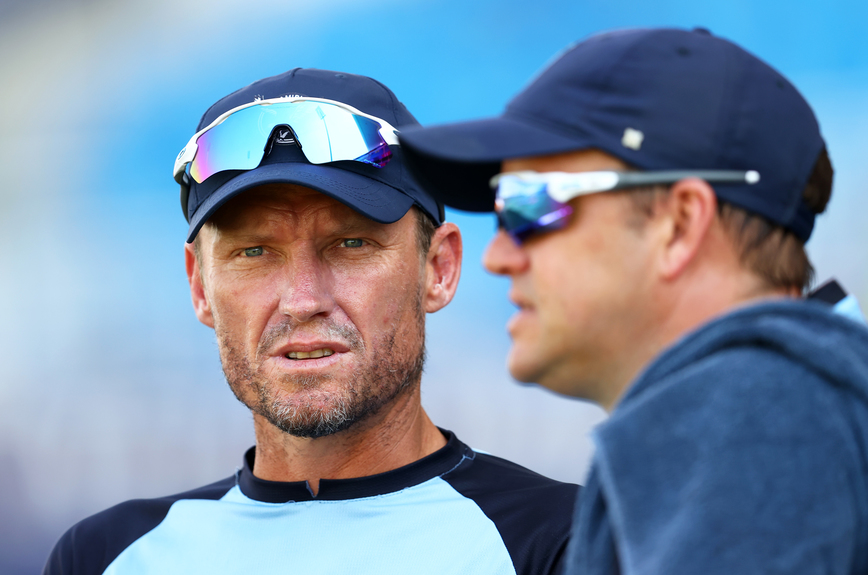 INTERVIEW
INTERVIEWIt took years of hard work, toil and sweat for Namibia to make it to the World Cup, who did more than just to make up the numbers. After eliminating Ireland, they are set to take on the world's best teams in the Super 12s – a stage they have reached for the first time in their history. It is indeed a momentous occasion for Namibia, who have a population of 2.5 million, to be among the final 12 teams in the T20 World Cup, a journey that started way back in 2018, with them playing in the African Qualifiers in 2018.
Namibia beat the Netherlands and Test-playing nation Ireland in the first round of the T20 World Cup to make it through to the next round and they are set to ring in a new era in their cricket history when they take on Scotland on Wednesday (October 27)
In an exclusive chat with Cricket.com, batter Craig Williams – Namibia's second-highest run-getter in T20Is – spoke about the team's journey into the Super 12s, skipper Gerhard Erasmus, on the commendable job the coaching staff has done, among other topics.
Here are the excerpts from the chat:
Cricket.com (CDC): It was an emotional moment when David Wiese hit those winning runs against Ireland. Walk us through the emotions in the middle and in the dressing room when that moment arrived.
 Craig Williams (CW): It was extremely emotional for the whole team. It’s been a three-year process since Pierre de Bruyn, Albie Morkel joined us of rebuilding and getting new things in place. The moment was fantastic but I think the emotion came from the amount of work that’s gone in the last three years, the amount of sacrifices, early hours in the gym, look weekends of play, long trips away from home. All came together when we realised we’ve done something extremely special for the country.
Craig Williams (CW): It was extremely emotional for the whole team. It’s been a three-year process since Pierre de Bruyn, Albie Morkel joined us of rebuilding and getting new things in place. The moment was fantastic but I think the emotion came from the amount of work that’s gone in the last three years, the amount of sacrifices, early hours in the gym, look weekends of play, long trips away from home. All came together when we realised we’ve done something extremely special for the country.
CDC: What does making it to the Super 12s mean to cricket in Namibia? Would you rate this as the best moment in your career?
CW: Definitely rate this as the highlight of my career. I’ve been playing for 13-14 years and it is by far the biggest highlight. I’ve been to more than 15 of similar types of qualifiers and this is the first one we’ve managed to pull through, which just shows how hard the competition is. I think for Namibia, it’s just fantastic because now all of our kids can believe that hard work pays off and it is possible to achieve your dreams and goals. For cricket in Namibia and for sport in Namibia this is just a fantastic achievement for the country and is definitely something that’s going to boost all sports in the country moving forward.
CDC: Tell me about this journey - right from the Qualifiers and now among the top 12 teams in the World Cup - how would you sum it up?
CW: The journey started when we travelled to Uganda in 2018. It then went to Dubai for a month to play against 24 countries out of which only eight went through. That was extremely difficult and everyone were fighting for those four places to get to the World Cup. Just qualifying to that qualifier was really hugely emotional experience.
Then having to come to another qualifier at the World Cup and qualifying for the main tournament – it has been a two-year process, two-emotional roller-coaster which is very difficult to describe. Every game you play is win or lose, go home, extreme disappointment or extreme happiness and achievement. It’s been a two-year process. I’m glad we’ve managed to get this far because now we go straight to the next World Cup. We skip a whole lot of qualifiers and a whole lot of stress.
In a country like Namibia, we’re not fully professional so, to have guys who are working and studying and still trying to be professional cricket players, it’s an unbelievable story and an unbelievable achievement.
CDC: Some teams like the Netherlands have struggled to find form due to the lack of T20 cricket since the Qualifiers in 2019. Even Namibia have had limited game time before the T20 World Cup. How did you and the rest of the team cope with it and put in a commendable performance in the tournament?
CW: We probably have not had as many games as what we would have like. That’s what the Netherlands struggled with, but we have never stopped training. Even in the lockdown, we would be doing coaching sessions on Zoom with our coaching staff. We did backyard cricket training where you had to post your batting and bowling. The coaches were able to look at our technique from Zoom calls. It’s been tough preparing in Covid times, but we haven’t stopped.
You just take your hat off to the coaching staff for they were able to think outside the box. How they were able to find ways to keep us on our toes. We haven’t played as many games as we would have liked. We’ve played five series though which was fantastic that the guys were able to organise games for us. Our preparation has been extremely good compared to maybe some of the other countries like Netherlands.
CDC: You batted at three in the first couple of matches but opened in the game against Ireland. You have been juggled quite often in the batting line-up. Is that something you are comfortable with? How do you deal with all the shuffling?
 CW: In T20 cricket you have to be able to adapt, you have to be able to play different roles. As one of the senior players, I don’t mind being moved around. I am happy to open, to bat at three or to carry drinks as 12th man. The whole team has got that attitude that as conditions change as the opposition changes, we also need to adapt. I’m just happy to be able to contribute, to still be able to play. So, I’m comfortable with any tactics or plans the coaches need on any given day.
CW: In T20 cricket you have to be able to adapt, you have to be able to play different roles. As one of the senior players, I don’t mind being moved around. I am happy to open, to bat at three or to carry drinks as 12th man. The whole team has got that attitude that as conditions change as the opposition changes, we also need to adapt. I’m just happy to be able to contribute, to still be able to play. So, I’m comfortable with any tactics or plans the coaches need on any given day.
CDC: We've seen what a talented batsman Gerhard Erasmus is, but what would you say he is as a leader?
CW: Gerhard as captain has been extremely good for the team. He’s a leader. He has led a lot of different teams. He was captain at Maties (Stellenbosch University) when he was in university, he was the captain of the Under-19 Namibian team. So, it’s not anything new for him to be a leader. The way he manages guys and leads by example is fantastic. He’s a natural.
 When the pressure is on he manages to step up and show everybody why he is in that position. We are very blessed as a team and a country to have someone like him. They are one in a million, they don’t just come around every single day. He has been absolutely fantastic for us. He is still young. He’s still got another 10-12 years of playing for Namibia, of leading Namibia, to keep breaking records and taking us to the next level.
When the pressure is on he manages to step up and show everybody why he is in that position. We are very blessed as a team and a country to have someone like him. They are one in a million, they don’t just come around every single day. He has been absolutely fantastic for us. He is still young. He’s still got another 10-12 years of playing for Namibia, of leading Namibia, to keep breaking records and taking us to the next level.
CDC: David Wiese has put up a couple of match-winning performances in the tournament already. How important was it for Namibia to rope in someone of his experience?
CW: David has been fantastic for the team, he has played around the world and he showed that when the pressure is on, he really steps up. It’s been fantastic to have someone of his caliber join our team. He is proud to be playing for Namibia and to be doing well for us. Players travel, go to different countries, they look for opportunities and we’re just fortunate to have a Namibian like David come back and join us.
I know it’s been in his plan for a long time to come play for Namibia and with Covid, that’s delayed the process for two years. It’s fantastic to have him as part of our squad and to have his experience with our next generation learning from someone like him. It’s just not what he is doing on the field, winning us games, it’s also what he is doing off the field as well – teaching the next generation of what it is all about.
Because of someone like him, we will see the next young Namibians, the next David Wiese coming through the pipeline sometime soon.
CDC: You'll be facing some terrific sides in the Super 12s. Any side or player(s) you or looking forward to facing and why?
CW: Going through to the Super 12s, gives us an opportunity to test ourselves against some of the best teams in the world. We just want to make the Namibians proud by doing our best. On the day anything is possible. We have already had some tough games already to get this far. It’s a privilege to play against the best players in the world, I can’t single out one team or one player I would like to play against. Every single one of them is going to be a fantastic experience. Hopefully we can just keep clear heads and play the ball, not the player and continue to make the Namibians proud.
CDC: Ever since Pierre de Bruyn took over as head coach, it has been onwards and upwards for Namibia. How has it been working with him over the last two years or so?
CW: Pierre is a world-class coach. He’s got a huge pedigree. He coached for a long time in South Africa. He played first-class cricket himself for 18 years. He knows what it’s all about. You can relate to him as a player because he played at a very high level himself. He came to Namibia and made us believe in ourselves. He brought in a new culture of respecting each other, respecting the game and that’s made a big difference. From a coaching perspective, he knows how to handle and treat players because he has been in our shoes.
 He is brilliant at managing different situations, different types of players. He is always thinking of new ways to make us better. To think what it took Namibia when he came in two and a half three years ago to where we are now, it’s a true attribute to how good he is and how he is able to take such a small team and achieve greatness.
He is brilliant at managing different situations, different types of players. He is always thinking of new ways to make us better. To think what it took Namibia when he came in two and a half three years ago to where we are now, it’s a true attribute to how good he is and how he is able to take such a small team and achieve greatness.
I don’t think there is enough said about how good this guy is as a coach. He has brought Albie Morkel along with him. Albie is Mr. Cool under pressure situations because he has been playing in the IPL and also for South Africa. He is able to relate and help us handle those situations.
CDC: Tell me a bit about your cricketing journey. What/who drew you towards the game growing up?
CW: I was born in Namibia and grew up in Pretoria. At the age of six, in Pretoria watching the greats back in the day play, I just loved their game. I wanted to be a professional cricket player for as long as I can remember. I didn’t want to sit in an office, I wanted to be out in the field, play and compete. Namibia gave me those opportunities.
I moved to Namibia when I was 23 after spending some time in the UK playing cricket. Namibia gave me the opportunity to play first-class cricket and to live my dream. There’s a lot of hard work, lots of disappointments, lot of qualifiers we didn’t make it to get to where we are now. Every single day just appreciate the opportunities we have been granted and hard work does really pay off. That’s the biggest lesson I’ve learnt. Be persistent and resilient and the rewards will come. That’s the message I send to the kinds at my cricket academy in Windhoek is that every day you spend in training and try to get better is one step closer to achieving your dreams and your goals.
Namibia is a beautiful country. Our people have been through so much with drought and Covid and fires and recessions. This is just a beautiful story how this small group of people have been able to compete with the giants. We hope all the people back home can take into their personal lives and just realise that dreams do come true.